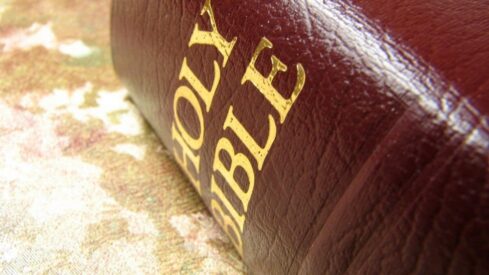We cannot be a follower of both Jesus and Paul at the same time, as the above verses clearly show. The Bible, both the Old Testament and the New Testament categorically say that God is one and ONE ONLY. You may retort: “No, He is one in three; God is three persons in one God, and Jesus is one of the three persons in One God”.
But really, was Jesus God?
The answer may come as a shock to many Christians. Jesus never said he was God. Actually, he said over and over again, and in many ways, that he was not God. Jesus was a practicing Jew, and the very idea of God taking a human form is antithetical to the Torah or the Law of Moses.
The following quote proves that Jesus was a devout and learned Jew, a rabbi:
“Jesus returned in the power of the Spirit to Galilee, and his reputation spread throughout the region. He was teaching in their synagogues, and all were loud in his praise. He came to Nazareth where he had been reared, and entering the synagogue on the sabbath as he was in the habit of doing, he stood up to do the reading.” [Luke 4:14-16]
As a rabbi, what did Jesus teach?
Throughout the New Testament, Jesus exhorted the people to worship God alone and keep the Mosaic commandments. The first and the best known commandment in both the Old Testament and the New Testament, asks for total and absolute devotion to God alone:
“The Lord our God is Lord alone! Therefore, you shall adore the Lord your God with all your heart, with all your soul, with all your mind, and with all your strength.” [Deuteronomy 6:4-5] [Mark 12:29-30]
Jesus most particularly stressed this First Commandment:
The scribe said to him: “Excellent, Teacher! You are right in saying, `He is the One, there is no other than He.’ �Yes, `to love him with all our heart, with all our thoughts and with all our strength, and to love our neighbor as ourselves’ is worth more than any burnt offering or sacrifice.” Jesus approved the insight of his answer and told him, “You are not far from the reign of God.” [Mark 12:32-34]
Again, Jesus’ straightforward injunction to follow the First Commandment in particular, is so obvious. Significantly, he described the First Commandment as “The Great Commandment” (Mark 12:29).
For Jesus, this commandment meant more than just an injunction against worshipping idols. Jesus taught the absolute devotion to God alone:
On one occasion a lawyer stood up to pose him this problem: “Teacher, what must I do to inherit everlasting life?” Jesus answered him: “What is written in the law? How do you read it?” He replied: “You shall love the Lord your God with all your heart, with all your soul, with all your strength, and with all your mind; and your neighbor as yourself.” Jesus said: “You have answered correctly. Do this and you shall live.” [Luke 10:25-28]
Jesus even scolded those who called him Lord: “None of those who cry out, `Lord, Lord,’ will enter the kingdom of God but only the one who does the will of my Father in heaven. When the day comes, many will plead with me, `Lord, Lord, have we not prophesied in your name? Have we not exorcised demons by its power? Did we not do many miracles in your name as well?’ Then I will declare to them solemnly, `I never knew you. Out of my sight, you evil doers!’ ” [Matthew 7:21-23]
Surely, when Jesus prayed in the Garden of Gethsemane he demonstrated that he was neither omnipotent nor omniscient:
“Father, if it is your will, take this cup from me; yet not my will but yours be done.” [Luke 22:42]
Jesus made it clear in many, many ways that he was not God, that God is greater. Nowhere is this more definitely stated than when he spoke to his disciples about his imminent departure:
“If you truly loved me you would rejoice to have me go to the Father, for the Father is greater than I”. [John 14:28]
We see that throughout the Gospels, Jesus prayed to God. This certainly argues against his being God. God would not pray to Himself.
There were times when Jesus felt the need to pray with special urgency. Luke reports that, on one occasion, Jesus prayed very hard:
“In his anguish, Jesus prayed with all the greater intensity, and his sweat became like drops of blood falling to the ground.” [Luke 22:44]
One of the most compelling pieces of evidence that Jesus was not God is in the way that he taught the disciples to pray:
One day he was praying in a certain place. When he had finished, one of his disciples asked him, “Lord, teach us to pray, as John taught his disciples.”
He said to them, “When you pray, say: `Our Father in heaven, hallowed be your name, your kingdom come, your will be done on earth as it is in heaven. Give us today our daily bread, and forgive us the wrong we have done as we forgive those who wrong us. Subject us not to the trial but deliver us from the evil one.’ ” [Luke 11:1-4] [Matthew 6:9-13]
Note that Jesus taught us to pray to the Father, our Creator, not to himself. In fact, he did not mention himself in any way, nor did he indicate that we should pray in his name. His instructions were very specific-we are to pray to God alone. This would not be the case if Jesus himself were God.
Conclusion:
Jesus followed the Mosaic law and did not claim divinity. According to the Bible, He was not omniscient nor omnipotent. Given the fact that nowhere in the Bible do we see a direct identification of Jesus as God, and that Jesus strongly upheld all the commandments and emphasized the First Commandment, we can only conclude that the doctrine of Jesus’ divinity has no foundation in the scripture nor in the life and teachings of Jesus. This concept is an innovation in Christian doctrine.
This may be a radical conclusion for you. Radical, only if you are not familiar with the historical development of the doctrine of Christ’s divinity.
*Shahul Hameed
For more details read: “JESUS” – Myths & Message by Lisa Spray, June, 1992,


















